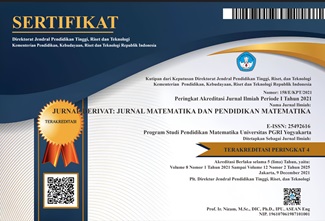Pengembangan Bahan Ajar Matematika Berbasis Integrasi-Interkoneksi Untuk Memfasilitasi Penalaran Dan Pemecahan Masalah
DOI:
https://doi.org/10.31316/j.derivat.v4i2.157Abstract
This research aims to produce and see the effectiveness of interconnection-based mathematics-based teaching materials to facilitate the reasoning and problem-solving skills of high school students. The method used is research model development Borg & Gall with three phases: an introduction that includes literature review and analysis of student characteristics, stage of development which include determining the basic competencies and indicators, the analysis of the materials, writing materials, and instruments, and the stage of validation includes expert validation, revision I, small group trial, analysis of the trial results, revision II, and packaging the final product. The research result is drafting a set of mathematics teaching materials based integration-interconnection effective to facilitate reasoning, and problem-solving abilities of high school students worthy with the results of the assessment of Very Good is 157.5 of the maximum score 172 or percentage 91.2% and posttest result of average mathematical reasoning 77.21 and average problem-solving ability 76.01. Also of the test is found that teaching materials can be used well in learning with positive impact.
Â
Keywords: mathematics teaching materials, interconnect integration, reasoning, problem-solvingDownloads
Published
Issue
Section
Citation Check
License
Authors who publish with this journal agree to the following terms:
-
Authors retain copyright and grant the journal right of first publication with the work simultaneously licensed under a Creative Commons Attribution-ShareAlike 4.0 International License that allows others to share the work with an acknowledgment of the work's authorship and initial publication in this journal.
- Authors are able to enter into separate, additional contractual arrangements for the non-exclusive distribution of the journal's published version of the work (e.g., post it to an institutional repository or publish it in a book), with an acknowledgment of its initial publication in this journal.
- Authors are permitted and encouraged to post their work online (e.g., in institutional repositories or on their website) prior to and during the submission process, as it can lead to productive exchanges, as well as earlier and greater citation of published work (See The Effect of Open Access).







